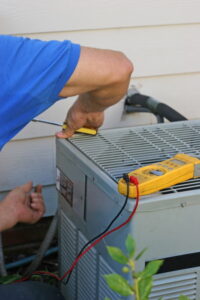Refrigerant is one of the vital components in an air conditioning system. Without refrigerant circulating through an AC, it can’t carry out heat exchange, the method it uses to cool down a space. Losing refrigerant will not only restrict an air conditioner’s ability to provide cooling, it will eventually cause the entire system to fail.
Unfortunately, people often have misconceptions about what refrigerant is and how it works, and this can lead to serious AC problems. Refrigerant leaks are a common AC malfunction, and understanding why that is and how refrigerant affects the air conditioner can help you catch trouble early and know what to do.
Leaking refrigerant is a serious problem that calls for fast and professional air conditioning repair in Yakima, WA. Below we’ll explain the basic facts of this problem.
Refrigerant is not a fuel
The first fact to know about refrigerant is something that it’s not, which is a fuel source. Refrigerant doesn’t power your air conditioning system. What powers your AC is electricity. Why is this important to know? Because it helps explain that…
An air conditioner does not use up refrigerant
This is the big misunderstanding people have about refrigerant: they assume the AC is consuming the refrigerant to run (probably because they think of it as a fuel). It doesn’t. Unless an air conditioner develops refrigerant leaks, the same amount of refrigerant will remain in the air conditioner for its entire service life. This amount is known as the air conditioner’s charge.
Refrigerant is a heat exchange medium
So if refrigerant isn’t a fuel, what is it? It’s a blend of chemicals that serve as a heat exchange medium, a way for the air conditioner to absorb heat along the indoor coils (cooling the air) and then releasing it along the outdoor coils. The refrigerant doesn’t dissipate as it goes back and forth between liquid and gaseous states, which is why it shouldn’t “run out.”
Loss of refrigerant jeopardizes the entire air conditioning system
When refrigerant begins to leak from holes in the refrigerant lines or gaps at line connections, the charge of the system will drop below the factory level. This will begin to affect the AC’s energy efficiency and lower its performance. But the major concern is that the AC isn’t designed for this lower charge, and the change in pressure within the system will eventually cause the compressor to overheat and burn out—which is usually the end of the line for an AC!
Only professionals can fix leaks and recharge an AC
If you notice your air conditioner is performing poorly, or your cooling bills have suddenly risen, call for professionals to see if there’s a refrigerant leak. You must have pros handle this job. Not only must they locate and seal the leaks, but they must also recharge the refrigerant with the amount that was loss to restore the system to its original charge. Only licensed technicians can handle refrigerant, and professionals will also make sure they don’t put in too much refrigerant. An overcharged AC is in as much danger as an undercharged one.
Call ThermAll Heating & Cooling, Inc: We are “Your Home Comfort Hero!”

